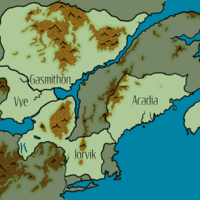Glist
Loosely-knit groups of coastal gypsies.
- They cross national boundaries pretty freely, trading what they scavenge and fish from the ocean in the cities. They are tolerated by authorities because of the quality and oddity of their wares.
- They should be known for their huge water dogs, which they use to hunt and as beasts of burden. However the dogs are much a part of each family as the people and are very respected and loved.
- They are accepting of outsiders, and sometimes people run away from their problems or past to live with the Glist. Likewise, members of the families occasionally abandon their nomadic lifestyle and settle in a city or town. Whenever a band of Glist passes through the town of one of these wayward children, there is always a great celebration and reunion.
- They worship the sea as a living deity, but worship is a relatively mild part of their lives. Freedom and beauty are their highest ideals.
- A bloodline of divers runs strong in the Glist. Many of them can hold their breath for an amazing time, see moderately well underwater, and are resistant to the cold northern sea.
- They are not particularly good seafarers, however, staying close to shore and relying more on their dogs and those with the diver's blood to procure things from deep waters.
- There are rumors of a Cathedral of Glist, where they make pilgrimages on occasion to do worship to the sea. The structure is said to be made of driftwood and flotsam, with mosaic windows of sea-glass.
The Glist move north along the coast during the spring, trading strange spices, scrap metal, oilcloth, and relics for leather, grain, and sea glass. They also fish and forage along the way, trading the excess for wine. In summer, they disappear beyond the northern borders Land of Still Waters.
As autumn draws on, they return, bearing furs, intricate glass sculptures and trinkets, and potent spirits. Much of this they exchange for flax. By winter, their songs and creaking dog-carts have vanished into the south.
It's commonly suspected most Glist winter in warmer climes, combing the seas and beaches, and working the flax into oilcloth. Some, however, seem to stay in freezing north, and spend the winter tending distilleries and glass forges after hunting and trapping through the spring and summer months. The north is also the rumored location of the great Cathedral.
Most settlements welcome the migrating Glist, if perhaps a little warily. Their wares are good and their demeanor pleasant, but they're often viewed as a disruptive element, and every few years someone goes missing when the caravan moves along. Some of these people return years later, having sown their oats, but most are never heard of again. There are whispers that not all the disappearances are voluntary, though this would seem to contradict the merry and free spirit of the gypsies.
In truth, the Glist have a shadow in the bloodline of their divers. Blessedly rare, sometimes one of them comes to see the ocean as a darker, more personal force than it is normally revered as among them. Striving to protect their people, the afflicted offers sacrifice from among the land-dwellers.
Existence of this malady is desperately hidden from outsiders and solemnly dealt within the band when discovered, which may not be for several years, as the divers appear outwardly normal. What causes it is not known. Some suspect it is purely a psychological effect of spending too much time in the lightless depths, others a remnant of the Slow Burn. There is also suspicion of involvement by the Thaia-thaan'ag, given the dark and apocalyptic outlook of the tainted divers.
